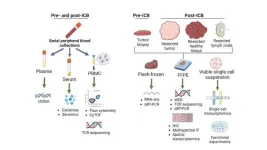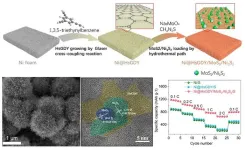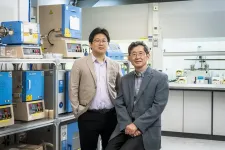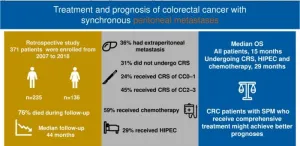(Press-News.org) In some patients, infection with the pandemic virus SARS-CoV-2 can trigger a dangerous immune response in hardened fatty deposits (plaques) lining the heart’s largest blood vessels, a new study shows.
The findings are based on the body’s immune system, which evolved to destroy invading microbes but also drives disease when triggered in the wrong context. Doing so brings on a set of responses termed inflammation, including swelling, which results as immune cells and signaling proteins home in on infection sites. Misplaced inflammation can lead to both immediate and longer-lasting heart issues, such as the breaking up of artery-clogging plaques, and may contribute to the group of symptoms referred to as “long COVID,” the authors say.
Experts have long observed that the COVID-19 coronavirus increases the likelihood of having a heart attack or stroke for up to a year after infection, particularly for those who already have underlying heart conditions. However, the specific mechanisms that account for these risks had until now remained unclear. Led by researchers at NYU Grossman School of Medicine, the study explored how the coronavirus behaves in those with atherosclerosis, a disease in which plaque collects in major arteries and prompts chronic inflammation.
As part of the findings, publishing online Sept. 28 in the journal Nature Cardiovascular Research, the team detected the virus within the arteries of eight men and women with a history of atherosclerosis who had died of COVID-19. Besides colonizing arterial heart tissue itself, the coronavirus was also spotted inside local immune cells called macrophages, which normally protect the heart by “swallowing” and disposing of excess fat molecules in arteries.
The experiments further showed that in response to the infection, the macrophages released inflammatory signaling proteins called cytokines that promote a chronic immune response. Notably, the researchers say, two of the identified cytokines, interleukin-1 beta and interluekin-6, have already been linked to heart attacks.
“Our findings provide for the first time a direct mechanistic link between COVID-19 infection and the heart complications it provokes,” said study lead author Natalia Eberhardt, PhD, a postdoctoral fellow in the Department of Medicine at NYU Langone Health. “The virus creates a highly inflammatory environment that could make it easier for plaque to grow, rupture, and block blood flow to the heart, brain, and other key organs.”
Past research has revealed that the coronavirus stirs up a massive immune response throughout the entire body. This cytokine storm, as it is called, is suspected to contribute to heart issues, says Eberhardt. However, the new study was designed to uncover more direct mechanisms that could be at play as well.
For the analysis, the research team collected 27 artery tissue samples from autopsies of patients who had died of severe COVID-19 between May 2020 and May 2021. All had been previously diagnosed with heart disease. Next, the authors trained an artificial intelligence computer program to measure coronavirus levels in plaque cells, noting that while viral genetic material was detected using fluorescent dyes viewed under a microscope, the program was able to count thousands of viral features on a cell-by-cell basis.
The team also examined samples of plaque-covered tissue collected from patients who had received surgery to remove the fatty buildup from their arteries. Using a new technique that allowed them to study coronavirus infection of live tissue in the lab, the researchers showed that exposing plaque to the virus boosts inflammation levels in blood vessels.
Together the experimental findings revealed that macrophages rich in engulfed fat were invaded more frequently and for longer periods than those containing less fat. According to the researchers, this suggests that the coronavirus flourishes more easily in people who already have large amounts of plaque buildup in their arteries, explaining in part why those with atherosclerosis are more vulnerable to COVID-19.
“These results shed light onto a possible connection between preexisting heart issues and long COVID symptoms,” said study senior author and cardiologist Chiara Giannarelli, MD, PhD. “It appears that the immune cells most involved in atherosclerosis may serve as a reservoir for the virus, giving it the opportunity to persist in the body over time.”
As a result, the research team next plans to more closely explore this potential link between the coronavirus’s behavior during atherosclerosis and long COVID, which includes heart palpitations, chest pain, and fatigue, among other issues.
Giannarelli, an associate professor in the Departments of Medicine and Pathology at NYU Langone, adds that because current investigation analyzed tissue infected with viral strains that spread throughout New York City early in the pandemic, the authors intend to repeat the study in those exposed to newer variants.
Funding for the study was provided by the National Institutes of Health grants R01HL165258 and R01HL153712. Further funding was provided by the American Heart Association grant 20SFRN35210252 and a Chan Zuckerberg Initiative grant.
In addition to Eberhardt and Giannarelli, other NYU Langone investigators involved in the study are Maria Gabriela Noval, PhD; Ravneet Kaur, MS; Letizia Amadori, PhD; Michael Gildea, PhD; Swathy Sajja, MS; Dayasagar Das, PhD; Burak Cilhoroz, MS; Roza Shamailova, BA; Andrea Vasquez Guillen, AS; Jonathan Newman, MD, MPH; Thomas Maldonado, MD; Caron Rockman, MD; Amy Rapkiewicz, MD; Kenneth Stapleford, PhD; Navneet Narula, MD; and Kathryn Moore, PhD. Other study authors include O’Jay Stewart, BSc; Dawn Fernandez, PhD; Sonia Jangra, PhD; Michael Schotsaert, PhD; and Peter Faries, MD, at the Icahn School of Medicine at Mount Sinai in New York City.
Media Inquiries:
Shira Polan
Phone: 212-404-4279
shira.polan@nyulangone.org
END
Study helps explain how COVID-19 heightens risk of heart attack and stroke
2023-09-28
ELSE PRESS RELEASES FROM THIS DATE:
People who use alternative medicine favor risk and novelty, and distrust science
2023-09-28
Over 40 per cent of Canadians have used at least one risk-associated alternative health-care treatment in the past 12 months, says a new UBC study published in PLOS One.
The researchers explored alternative health-care therapies where the proven benefits do not justify the risks involved. They found that people who access these therapies tend to be wealthier, like novelty and taking risks, and are also more likely to distrust conventional medicine.
The multidisciplinary study between UBC School of Nursing and the University of Alberta Health Law Institute involved a survey of 1,492 Canadians ages 16 and over ...
SARS-CoV-2 infects coronary arteries, increases plaque inflammation
2023-09-28
SARS-CoV-2, the virus that causes COVID-19, can directly infect the arteries of the heart and cause the fatty plaque inside arteries to become highly inflamed, increasing the risk of heart attack and stroke, according to a study funded by the National Institutes of Health. The findings, published in the journal Nature Cardiovascular Research, may help explain why certain people who get COVID-19 have a greater chance of developing cardiovascular disease, or if they already have it, develop more heart-related complications.
In the study, researchers focused on older people with fatty buildup, known as atherosclerotic plaque, who ...
Immune checkpoint blockade prior to surgery promising in multiple cancer types
2023-09-28
Treating cancer with immunotherapies known as an immune checkpoint blockade (ICB) prior to surgery (so-called neoadjuvant immunotherapy) has been a rapidly growing area of research, but the scientific community is just scratching the surface of what is possible, according to a review article co-authored by several current and former investigators from the Bloomberg~Kimmel Institute for Cancer Immunotherapy and the Johns Hopkins Kimmel Cancer Center.
“We consider this approach to cancer immunotherapy to be a gold mine ...
HsGDY on Ni foam for loading MoS2/Ni3S2 to enhance the performance on lithium-sulfur batteries
2023-09-28
They published their work on Sep. 26 in Energy Material Advances.
"The booming progress of electric vehicles demands next-generation energy storage technologies with high energy density, low cost, and longevity." said Lu, a professor at the college of chemistry and chemical engineering in Shantou university. "Lithium-sulfur batteries are identified as a promising energy storage system because of their high ultrahigh energy density and large theoretical capacity. However, they are limited by the poor electronic conductivity of sulfur, volume changes of the cathode, and shuttle effect."
Lu explained that the conversion of polysulfides (Li2Sn, ...
Brief dialysis may be best for some kidney patients
2023-09-28
Patients with acute kidney injury requiring outpatient dialysis after hospital discharge receive the same care as those with the more common end-stage kidney disease, according to a study led by UC San Francisco.
But while patients with the latter diagnosis – typically caused by long-standing hypertension or diabetes – must remain on lifelong dialysis or receive a new kidney, some patients on dialysis for acute kidney injury have the potential to recover, the researchers reported in their study in the Journal of the American Society of Nephrology on Sept. 28, 2023.
“For ...
COOPERATE: Empowering minoritized patients with chronic back and other musculoskeletal pain to receive the care they need
2023-09-28
INDIANAPOLIS – A new study led by a U.S. Department of Veterans Affairs, Regenstrief Institute and Indiana University School of Medicine researcher focuses on empowering minoritized patients with chronic back and other musculoskeletal pain to receive care best suited to their individual values and preferences. Black patients continue to experience greater pain severity, worse pain outcomes and inadequate pain treatment compared to White patients, despite national priorities focused on health equity.
COOPERATE (Communication and Activation in Pain to Enhance Relationships ...
Novel battery technology with negligible voltage decay developed at CityU, a world’s first
2023-09-28
A pivotal breakthrough in battery technology that has profound implications for our energy future has been achieved by a joint-research team led by City University of Hong Kong (CityU).
The new development overcomes the persistent challenge of voltage decay and can lead to significantly higher energy storage capacity.
Lithium-ion batteries (LiBs) are widely used in electronic devices, while lithium-(Li) and manganese-rich (LMR) layered oxides are a promising class of cathodes for LiBs due to their high ...
Comprehensive treatment strategy could change CRC with SPM
2023-09-28
Colorectal cancer (CRC) with synchronous peritoneal metastases (SPM) is a challenging disease to treat, with a relatively poor prognosis. However, recent advances in treatment strategies have led to improved outcomes for patients with SPM.
The optimal treatment approach for CRC with SPM remains controversial. A growing body of evidence suggests that comprehensive treatment, including cytoreductive surgery (CRS), chemotherapy, and hyperthermic intraperitoneal chemotherapy (HIPEC), may improve patient outcomes.
A ...
Unlocking the potential of silicon anode materials for commercialized batteries
2023-09-28
In a groundbreaking review published in Nature Energy, Professor Jaephil Cho from the School of Energy and Chemical Engineering at UNIST presents an analysis protocol to evaluate silicon cathode materials applicable to commercialized batteries. The study delves deep into the characteristics and challenges surrounding silicon anode materials—the focus of significant attention as secondary battery components.
Silicon has emerged as a promising alternative to conventional graphite anodes in high-energy lithium-ion batteries due to its exceptional gravimetric capacity. However, intrinsic issues such as severe volume expansion during cycling have hindered the widespread ...
Mount Sinai Rehabilitation Centers ranked among the best in the United States by Newsweek
2023-09-28
Two Mount Sinai Health System hospitals are among the top-ranked for “America’s Best Physical Rehabilitation Centers for 2023” by Newsweek/Statista.
The Mount Sinai Hospital is ranked No. 2 in New York State for inpatient rehabilitation care, with stroke care designated as a “Standout Program.” Mount Sinai Morningside, on Manhattan’s Upper West Side, is ranked No. 5 for inpatient rehabilitation. These prestigious accolades highlight the exceptional quality of care and follow-up care, along with accommodations and amenities that are part of the rehabilitation ...



